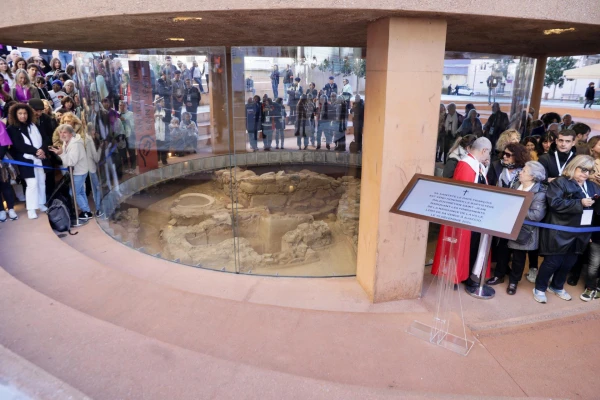Pope Francis’ visit to Corsica was marked by the meeting “Popular Religiosity in the Mediterranean”, an event that brought together bishops from France, Italy and Spain where the Pontiff affirmed that popular faith “reveals the presence of God in the living flesh.” of history.”
On his way to the Ajaccio Palace of Congresses and Exhibitions, the Holy Father stopped at the Baptistery of Saint-Jean, which dates back to the 6th century and was found in 2005 during excavations to build a car park.
Receive the main news from ACI Prensa by WhatsApp and Telegram
It is increasingly difficult to see Catholic news on social media. Subscribe to our free channels today:

Hundreds of people greeted Pope Francis as he passed with the popemobile through the street and from the balconies.
Pope Francis also greeted and blessed several young children and had an emotional meeting with a 108-year-old woman who held a sign saying she was the oldest woman in Ajaccio.
At the beginning of his speech at the meeting, after the welcome from the Bishop of Ajaccio, Cardinal Javier Bustillo, the Holy Father cast his gaze on the history and evolution of the Mediterranean, “a unique sea in the world.”
Before the participants in the congress, the Pontiff made reference to the secularization of Europe, where “the question about God seems to fade, finding us increasingly indifferent to his presence and his Word.”
However, he urged us to analyze this situation, “so as not to get carried away by hasty considerations or ideological judgments that, sometimes still today, contrast Christian culture and secular culture.”
In this sense, he made reference to believers who live “their own faith without imposing it,” as well as non-believers who “are not alien to the search for truth, justice and solidarity.”
Faced with these two horizons, he specified that one can appreciate the beauty and importance of popular piety, “which is always manifested in the culture, history and languages of a people, and is transmitted through symbols, customs, , the rites and traditions of a living community.”
Likewise, he pointed out that this practice attracts and involves people who are on the threshold of faith, who are not regular practitioners and, however, “they discover in it the experience of their own roots and affections, along with the values and ideals that they “they consider useful for their own life and society.”
“Popular piety, which expresses faith with simple gestures and symbolic languages rooted in the culture of the people, reveals the presence of God in the living flesh of history, strengthens the relationship with the Church and often becomes an occasion for encounter, of cultural exchange and celebration,” said the Pontiff.
Regarding popular piety, he also indicated that a particular theological and pastoral discernment must be carried out, since there is a risk that these manifestations “are limited to external or folkloric aspects, without leading to an encounter with Christ.”
Another risk, he added, “is that popular piety is used or instrumentalized by groups that seek to strengthen their own identity in a controversial way, feeding particularisms, antagonisms and exclusive positions or attitudes.”
“All of this does not respond to the Christian spirit of popular piety and challenges us all, particularly pastors, to monitor, discern and promote continued attention to popular forms of religious life.” Although, he clarified, piety must be festive, since it comes from the people.
Later, he stressed that “faith is not a private fact, which is consumed in the sanctuary of conscience, but – if it aims to be fully faithful to itself – it implies a commitment and a testimony towards all, for human growth, “social progress and care for creation, as a sign of charity.”
For this reason, he clarified that popular piety, processions and prayers, the charitable activities of the brotherhoods, the community prayer of the Holy Rosary and other forms of devotion can feed this “constructive citizenship” of Christians. The Pontiff assured that on many occasions theologians and intellectuals do not understand this concept.
In this context, he pointed out that the need arises to develop a concept of “secularism that is not static and rigid, but evolutionary and dynamic, capable of adapting to diverse or unexpected situations, and of promoting constant collaboration between civil and ecclesiastical authorities to the good of the entire community, each person remaining within the limits of his or her own powers and space.”
He referred to this as a “healthy secularism” that promotes “an open, frank and fruitful” and constant dialogue between the religious and secular worlds, between the Church and civil and political institutions.
Finally, he wanted to encourage young people to participate even more actively in socio-cultural and political life, “with the impulse of the healthiest ideals and the passion for the common good.”
